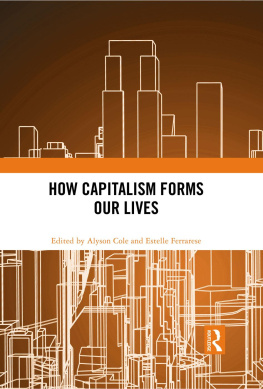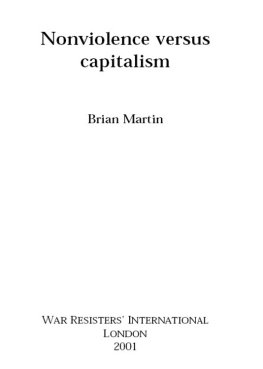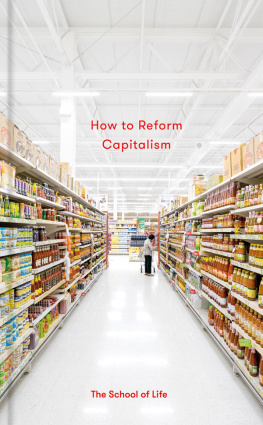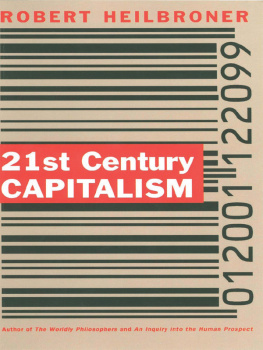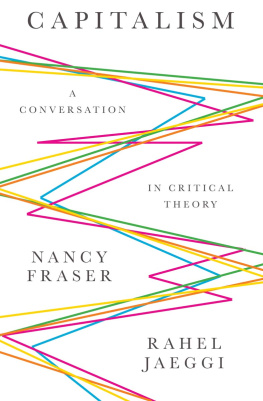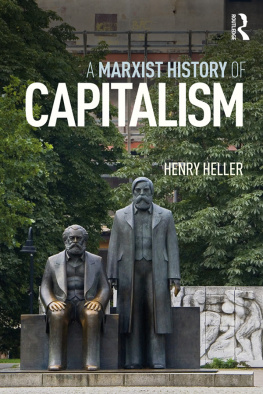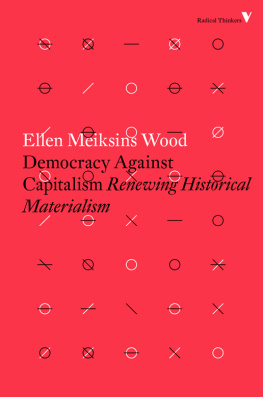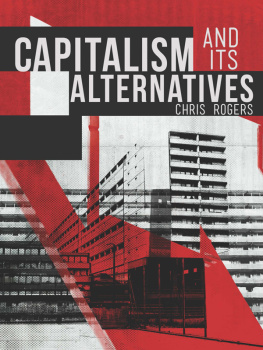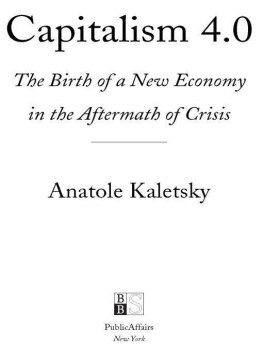How Capitalism Forms Our Lives
By using the concept of capitalism as a form of life, the authors in this volume reconceive capitalism, its mechanisms and effects on our bodies and on our common life.
The idea that capitalism is more than a discrete economic system and instead a form of life that shapes our relationships with others, our sense of ourselves and our capacities, practices, bodies, and actions in the material world should be rather obvious. Yet efforts whether through criticism or policy remedies to redress the vast inequalities, inherent exploitation, alienation, and the manifold destructive effects of capitalism on the environment, typically proceed without grappling fully with the entwinement of the economic with the social and cultural, much less the ethical, ontological, and phenomenological. This volume proposes form of life as a heuristic tool, connecting literatures that often remain isolated from one another the Frankfurt School, neo-materialism, Wittgensteins philosophy, Foucaults and Agambens biopolitics, and Marxs discussion of reproduction. In emphasizing economic practices, as opposed to capitalism as a system, they conceive of the economic as an integral and integrated dimension of life, and thus develop new possibilities for critique. Viewing human beings as economic bios, provides a needed alternative to analyses that position neoliberalism as an economic logic imposed upon the social and cultural.
This book was originally published as a special issue of the Journal for Cultural Research.
Alyson Cole is Professor of Political Science, Gender Studies, and American Studies at Queens College and the Graduate Center at the City University of New York (CUNY), USA. She is the author of The Cult of True Victimhood: From the War on Welfare to the War on Terror (2007), and co-editor of Michael Paul Rogin: Derangement and Liberalism (2019).
Estelle Ferrarese is Professor of Moral and Political Philosophy at Picardie-Jules-Verne University, France. Her authored and edited books include Vulnerability and Critical Theory (2018), La fragilit du souci des autres: Adorno et le care (2018), The Politics of Vulnerability (2017), and thique et politique de lespace public: Jrgen Habermas et la discussion (2015).
How Capitalism Forms Our Lives
Edited by
Alyson Cole and Estelle Ferrarese
First published 2020
by Routledge
2 Park Square, Milton Park, Abingdon, Oxon, OX14 4RN
and by Routledge
52 Vanderbilt Avenue, New York, NY 10017
Routledge is an imprint of the Taylor & Francis Group, an informa business
2020 Taylor & Francis
All rights reserved. No part of this book may be reprinted or reproduced or utilised in any form or by any electronic, mechanical, or other means, now known or hereafter invented, including photocopying and recording, or in any information storage or retrieval system, without permission in writing from the publishers.
Trademark notice: Product or corporate names may be trademarks or registered trademarks, and are used only for identification and explanation without intent to infringe.
British Library Cataloguing in Publication Data
A catalogue record for this book is available from the British Library
ISBN13: 978-0-367-32224-3
Typeset in Myraid pro
by Newgen Publishing UK
Publishers Note
The publisher accepts responsibility for any inconsistencies that may have arisen during the conversion of this book from journal articles to book chapters, namely the inclusion of journal terminology.
Disclaimer
Every effort has been made to contact copyright holders for their permission to reprint material in this book. The publishers would be grateful to hear from any copyright holder who is not here acknowledged and will undertake to rectify any errors or omissions in future editions of this book.
Contents
Alyson Cole and Estelle Ferrarese
Max Horkheimer (revised translation by Alyson Cole and Estelle Ferrarese)
Rahel Jaeggi
Estelle Ferrarese
David Harvey
Frances Fox Piven
Daniele Lorenzini
Alyson Cole
Victoria Hattam
Cedric G. Johnson
Timothe Haug
Sharon P. Holland
The chapters in this book were originally published in the Journal for Cultural Research, volume 22, issue 2 (June 2018). When citing this material, please use the original page numbering for each article, as follows:
Chapter 1
How capitalism forms our lives
Alyson Cole and Estelle Ferrarese Journal for Cultural Research, volume 22, issue 2 (June 2018) pp. 105112
Chapter 2
The state of contemporary social philosophy and the tasks of an institute for social research (1931)
Max Horkheimer
Journal for Cultural Research, volume 22, issue 2 (June 2018) pp. 113121
Chapter 3
Economy as social practice
Rahel Jaeggi
Journal for Cultural Research, volume 22, issue 2 (June 2018) pp. 122125
Chapter 4
The use of bodies. Agambens idea of a non-capitalist form of life
Estelle Ferrarese
Journal for Cultural Research, volume 22, issue 2 (June 2018) pp. 126136
Chapter 5
Universal alienation
David Harvey
Journal for Cultural Research, volume 22, issue 2 (June 2018) pp. 137150
Chapter 6
The enduring regulation of the poor
Frances Fox Piven
Journal for Cultural Research, volume 22, issue 2 (June 2018) pp. 151153
Chapter 7
Governmentality, subjectivity, and the neoliberal form of life
Daniele Lorenzini
Journal for Cultural Research, volume 22, issue 2 (June 2018) pp. 154166
Chapter 8
The subject of objects: Marx, new materialism, & queer forms of life
Alyson Cole
Journal for Cultural Research, volume 22, issue 2 (June 2018) pp. 167179
Chapter 9
The whiteness of capital
Victoria Hattam
Journal for Cultural Research, volume 22, issue 2 (June 2018) pp. 180185
Chapter 10
Beyond the barricades: class interests and actually existing black life
Cedric G. Johnson
Journal for Cultural Research, volume 22, issue 2 (June 2018) pp. 186190
Chapter 11
The capitalist metabolism: an unachieved subsumption of life under the value-form
Timothe Haug
Journal for Cultural Research, volume 22, issue 2 (June 2018) pp. 191203
Chapter 12
Vocabularies of vulnerability
Sharon P. Holland
Journal for Cultural Research, volume 22, issue 2 (June 2018) pp. 204208
For any permission-related enquiries please visit:
www.tandfonline.com/page/help/permissions
Alyson Cole is Professor of Political Science, Gender Studies, and American Studies at Queens College and the Graduate Center at the City University of New York (CUNY), USA. She is the author of

